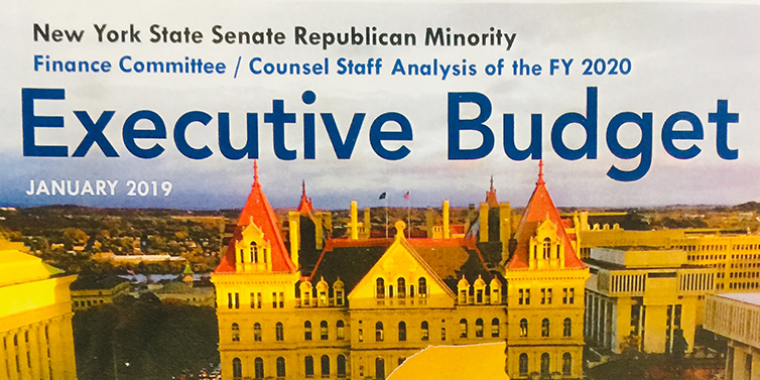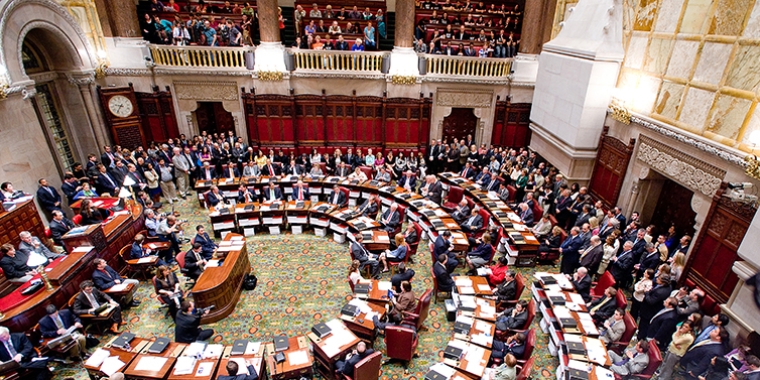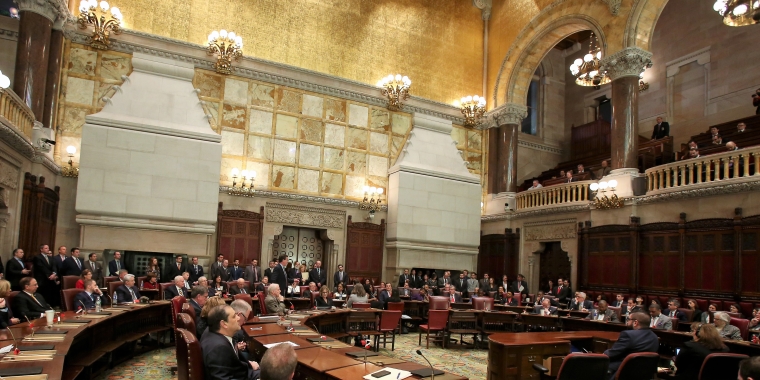
Senator Flanagan And Senate Colleagues Vote To Repeal MTA Payroll Tax
John J. Flanagan
June 15, 2011
-
ISSUE:
- Payroll Tax
Senator John Flanagan (2nd Senate District) today announced that the Senate has passed legislation he sponsored that would repeal the MTA Payroll Tax, easing an enormous financial burden that has caused job losses and hurt businesses across Long Island. The legislation Senator Flanagan supported, which has strong support from business organizations including the Hauppauge Industrial Association, Business Council of New York State and the National Federation of Independent Businesses, was also sponsored by Senator Lee M. Zeldin (3rd Senate District), Senator Jack Martins (7th Senate District) and other Senators representing the 12-county MTA region.
The Senate delegation introduced the legislation to repeal the job killing MTA Payroll Tax after hearing from countless constituents about how the tax has harmed businesses and how repealing it could help businesses invest, expand and create new jobs.
“By repealing the ill-conceived MTA Payroll Tax, we will be doing more than just protecting our business community. We will be helping create jobs for our residents, helping our not-for-profits survive and helping our tax base grow. And at a time when our economy is struggling to recover, these are all steps that will help our state and our nation move forward,” stated Senator Flanagan.
“I am very pleased to announce to my constituents, residents of Long Island and the rest of the 12-county MTA region that the state Senate will act on our legislation to repeal the job-killing MTA Payroll Tax,” said Senator Zeldin. “There is absolutely no doubt that the MTA, without increasing fares or cutting services, can balance its books after this legislation is implemented. One must question the motives and veracity of any individual or group that attempts to dispute this fact going forward.”
The phase-out would begin on January 1, 2012, by exempting small businesses of 25 employees or less, as well as public and non-public schools. The tax would be fully phased out by January 1, 2014 for the seven suburban counties outside of New York City. Within the five boroughs of New York City, the tax would be phased down to .21 percent and would remain at that level. The bill includes several provisions to provide the MTA with $465 million in revenues by 2014 to significantly offset revenues lost due to the significant reduction and repeal of the payroll tax, leaving $375 million, or about three percent of the overall MTA budget, for the MTA to absorb.
In addition to the Hauppauge Industrial Association, Business Council of New York State and the National Federation of Independent Businesses, the repeal of this MTA Payroll Tax is supported by The Long Island Business News, the New York Farm Bureau, GrowPAC, The Empire State Chapter of the Associated Builders and Contractors, Long Island Cares, Inc., The Long Island Business Council, New York State Catholic Conference, the Nassau-Suffolk Hospital Council, Tax Relief Now and several Chambers of Commerce.
Summary of Legislation
· Small businesses with 25 employees or less, as well as public and non-public schools throughout the entire Metropolitan Commuter Transportation District (MCTD), would be completely exempted from the payroll tax as of January 1, 2012.
· The payroll tax, for the seven suburban counties within the MCTD, beginning on January 1, 2012, will have tax rates reduced to 0.23 percent, to 0.12 percent for 2013 and then fully repealed as of January 1, 2014. These counties include Suffolk, Nassau, Westchester, Rockland, Orange, Putnam and Dutchess.
· Within New York City’s five boroughs, the tax would be reduced to 0.28 percent on January 1, 2013 and 0.21 percent beginning on January 1, 2014. The payroll tax would remain in effect at the 0.21 percent rate for New York City’s five boroughs.
· This legislation also includes several measures to mitigate the immediate fiscal impact of the PMT phase-out on the MTA’s operating budget and in order to provide the MTA with the opportunity to implement greater operating efficiencies. These mitigation measures will result in the MTA having to absorb only $375.6 million in foregone PMT revenue by 2014, a tiny 2.4 percent of the expected $15 billion MTA operating budget.
These measures include:
§ Direct up to $100 million Regional Greenhouse Gas Initiative (RGGI) funds collected within the MCTD to the MTA.
§ Eliminate the PMT for public and non-public schools and state savings from the PMT reduction.
§ Prohibit the use of transit funds for state General Fund relief and other purposes.
§ Restore a portion of the New York City revenue sharing in SFY 2014-15 and have it dedicated to the MTA for New York City transit purposes.
§ Dedicate a portion of the state sales tax on gasoline to transportation including transit and the Dedicated Highway and Bridge Trust Fund, which supports Department of Transportation capital spending.
The bill is sponsored in the Assembly by Assemblyman George Latimer (91st Assembly District).
IF YOU WOULD LIKE TO JOIN THE FIGHT TO REPEAL THE MTA TAX, PLEASE CLICK HERE
Share this Article or Press Release
Newsroom
Go to NewsroomStatement From Deputy Senate Republican Leader Joseph A. Griffo
January 23, 2019

Staff Analysis of the FY 2020 Executive Budget - WhiteBook
January 23, 2019

Senate Republicans Advance “Real Solutions” Budget Plan
January 15, 2019

Senate Democrats Fail Taxpayers
January 15, 2019
